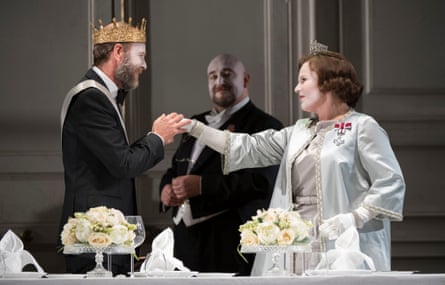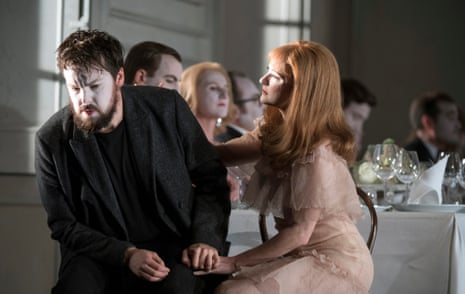One kindred reward of frequent opera going: to see a singer step up from supporting role to top billing in the same work later in the same season. Brett Dean’s Hamlet won high praise when it was premiered at Glyndebourne in the summer festival, with Allan Clayton in the title role. That cast, spiced with big names, was excellent. The British tenor David Butt Philip particularly impressed as Laertes.
The work now has a fresh lineup for the Glyndebourne tour, with Butt Philip as Hamlet. He leads a cast that is magnificent on its own terms. His performance, vigorous but pensive and self-absorbed, transfers some of the impetuous physicality of Laertes to the prince himself, from foil to foiled: an ideal Hamlet. Neil Armfield’s beautiful and lucid staging, designed by Ralph Myers and revived by Lloyd Wood, has yet greater clarity. Many uncertainties – mine, if not everyone’s – first time round fell away. The work emerges masterly and strong.
This sharpened focus, a paring down of any slight excess, often occurs in the transition from festival to autumn tour. It was noticeable in Barrie Kosky’s production of Handel’s Saul (2015), which became tighter, leaner. In a substantial new work such as Dean’s, that shift is yet more critical. Encountering it for the first time back in June, much scrutiny fell on how the librettist, Matthew Jocelyn, had handled Shakespeare’s sacred original (or, in the case of Hamlet, originals).
Spliced and sliced and reassembled with great care, it was judged skilful. Second time round it seems even more faithful and convincing. Now with some relief we can stop worrying about the free oscillations and exchanges of the text, how many times “or not to be” occurs or whether Gertrude has borrowed a line from Ophelia. All that matters is whether it works as opera. The audience member overheard complaining “but we don’t get all the soliloquies” might count themselves lucky. It’s already a long work, with a first half lasting nearly two hours. We’d still be there.
The conductor Duncan Ward – also a composer, which can only help in tackling a score as complex and layered as this – drew first-class performances from the Glyndebourne Tour orchestra and chorus. Dean uses the entire auditorium, from offstage instrumental groups and small choruses to live electronics. Broadly, as an aural impression, the first half is coloured by lowest woodwind, alto flute, bass and contrabass clarinet, contrabassoon, in ghostly discourse, fluttering, grumbling, threatening.

The play-within-a-play might feel long without the arresting accordion solo, salty and melancholy, played on stage by Miloš Milivojević. The shorter second half gives freer rein to the brass, full of jazzy, muted riffs and delicate effects. An additional piano and electronic keyboard, together with an array of percussion that includes plastic bottles, stones and sandpaper, adds to the strange, tactile sound world Dean has created.
When singers of the distinctive expertise of Sarah Connolly, Barbara Hannigan or John Tomlinson create roles – see the original-cast BBC Four relay on iPlayer now – there’s a danger of successive interpreters giving lame impressions. This was never the case here. As Gertrude, mezzo-soprano Louise Winter invented her own compelling version of regal guilt. Soprano Jennifer France made an outstanding Glyndebourne debut as Ophelia, holding back on hysteria until the music called for it. Bass Brian Bannatyne-Scott made a noble Ghost and an earthy Gravedigger with his own Edinburgh lilt. Gavan Ring’s grief-stricken Horatio, William Dazeley’s feckless Claudius, Jeffrey Lloyd-Roberts’s smooth and ponderous Polonius, with Rupert Enticknap and James Hall meticulous and obsequious as Rosencrantz and Guildenstern completed (nearly) the marvellous lineup. Get to Canterbury, Norwich, Milton Keynes or Plymouth before 2 December. Così fan tutte and Il barbiere di Siviglia are also on tour.
The Oxford Lieder festival – this year more than 50 concerts based on the theme of Mahler and fin-de-siècle Vienna – just gets better. Begun in 2002 by the pianist Sholto Kynoch, who is artistic director and a regular performer, it has developed a boldness hardly imaginable in those early years. A couple of standard venues has blossomed into more than a dozen, including cafe, church, library, school and pub. Star-name singers provide a backbone to the masterclasses and workshops for young singers vital to the festival’s work. It includes chamber music too, often for less obvious combinations.
At Headington school hall, the youthful Piatti Quartet, with Ann Beilby (viola) and Guy Johnston (cello), gave a dashing and sensuous account of Brahms’s String Sextet No 2, Op 36, pizzicato cellos and murmuring violas offsetting the rhythmic bite of upper strings. The soprano Alice Privett, stepping in at very short notice, was a faultless soloist in Zemlinsky’s scarcely known and voluptuous short work for voice and string sextet, Maiblumen blüten überall.
Two Oxford Lieder Young Artist Platform winners, the duo of bass-baritone Michael Mofidian and pianist Keval Shah, gave a showcase recital at Holywell Music Room. Choosing a wide-ranging programme of Brahms, Rachmaninov, Wolf and Sibelius, they proved exceptional. Shah’s playing is secure, deft and responsive. Mofidian, from the first, still note of the Brahms (Unbewegte laue Luft, which opens on the word “motionless”), showed himself a singer of immense talent, capable of linguistic and musical dexterity and, in a couple of the songs, a good comic actor too. That he looks a bit like a young Jonas Kaufmann has nothing to do with anything but I just thought I’d mention it.
Star ratings out of 5)
Hamlet ★★★★★
Oxford Lieder festival ★★★★

Comments (…)
Sign in or create your Guardian account to join the discussion